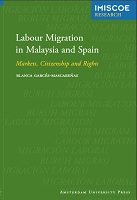Labour Migration in Malaysia and Spain
Markets, Citizenship and Rights
Abstract
State regulation of labour migration is confronted with a double paradox. First, while markets require a policy of open borders to fulfill demands for migrant workers, the boundaries of citizenship impose some degree of closure to the outside. Second, while the exclusivity of citizenship requires closed membership, civil and human rights undermine the state's capacity to exclude foreigners once they are in the country. By considering how Malaysia and Spain have responded to the demand for foreign labour, this book analyses what may be identified as the trilemma between markets, citizenship and rights. For though their markets are similar, the two countries have different approaches to citizenship and rights. We must thus ask: how do such divergences affect state responses to market demands and how, in turn, do state regulations impact labour migration flows? And what does this mean for contemporary migration overall? De overheid wordt in de regulering van arbeidsmigratie geconfronteerd met een dubbele paradox. Ten eerste: terwijl markten een op en grenzenbeleid vereisen om aan de behoefte van arbeidsmigranten en de marktvraag tegemoet te komen, leggen de grenzen die inherent zijn aan burgerschap een zekere afsluiting van de buitenwereld op. Ten tweede: terwijl de exclusiviteit die burgerschap met zich meebrengt een gesloten lidmaatschap vergt, ondermijnen burgerschap- en mensenrechten de mogelijkheid van de staat om buitenlanders uit te sluiten zodra zij zich in het land bevinden.
Keywords
public administration; sociology; bestuurskunde; sociologieDOI
10.26530/OAPEN_416050OCN
782878258Publisher
Amsterdam University PressPublisher website
https://www.aup.nl/Publication date and place
2012Classification
Migration, immigration and emigration
Relating to migrant groups / diaspora communities or peoples
Sociology and anthropology
Politics and government


 Download
Download